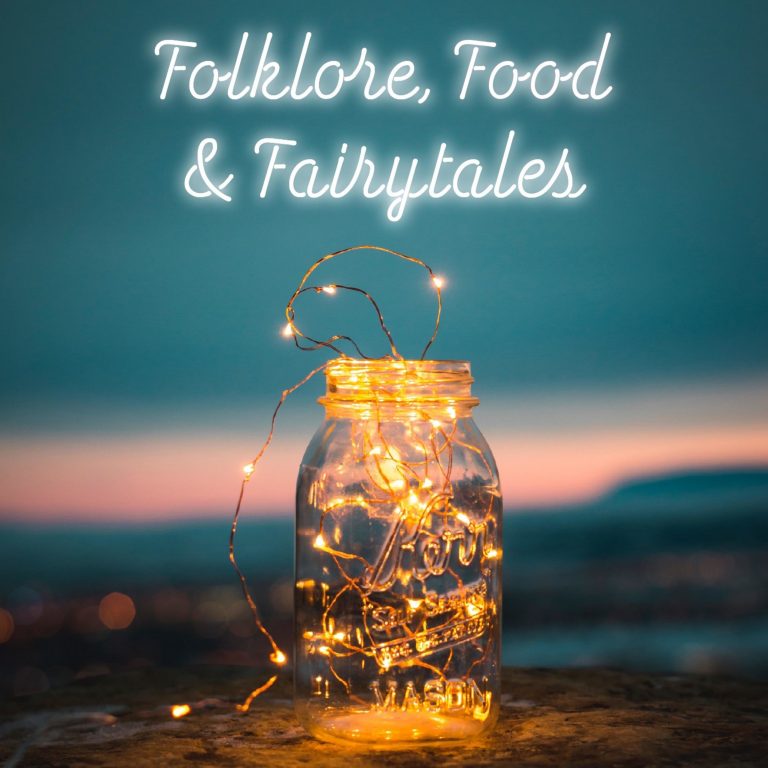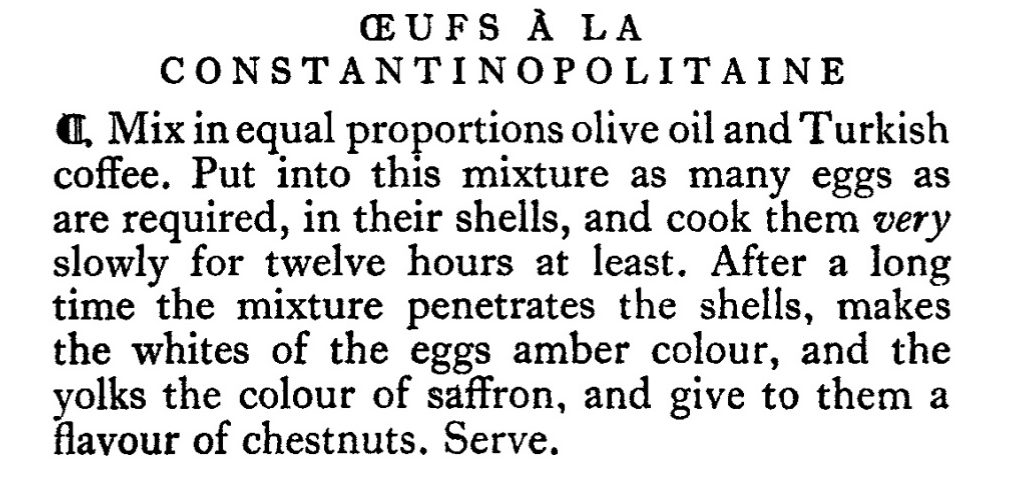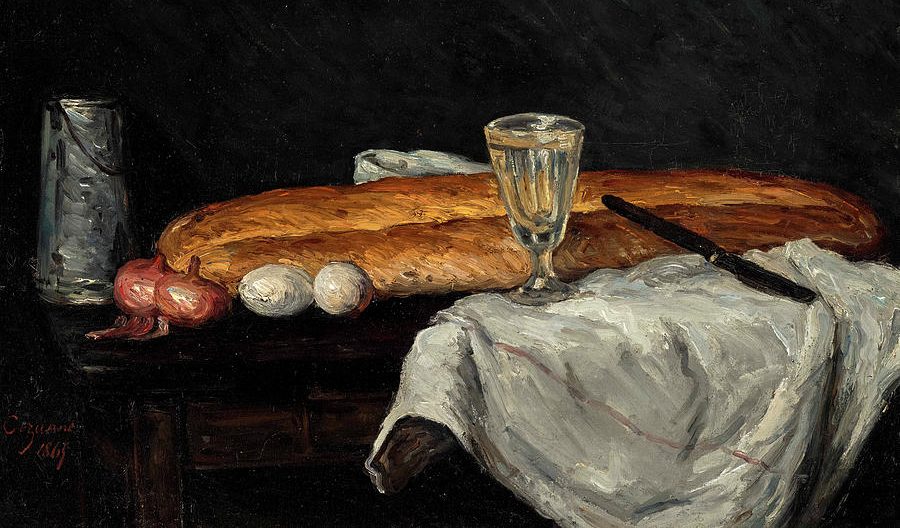In which we find out that eggs are not as straight forward as you might think, that luck doesn’t really come into it, that truths can be uncomfortable and that the advice you recieve from old women is invaluable no matter where they heard it.
In which we find out that eggs are not as straight forward as you might think, that luck doesn’t really come into it, that truths can be uncomfortable and that the advice you recieve from old women is invaluable no matter where they heard it.
Our story: The Search for Luck adapted from Modern Greek Folktales by RM Dawkins from 1953
Our Recipe: Chip Omelette
Here are the newsletter and Episode Recipe I mentioned.
You can find the interviews in my newest interview series here: How Food Frames Stories. You can find my interviews with storytellers here: Vernacular Voices of the Storyteller
You can also subscribe (or just read) my free newsletter for further snippets of folklore, history, stories, vintage recipes, herblore & the occasional cocktail.
You can also find out more at Hestia’s Kitchen which has all past episodes and the connected recipes on the blog. If you’d like to get in touch about the podcast you can find me here

What did you think of the story? I loved it, particularly as it was an old woman who was able to take the trip to alter her destiny instead of a young hero, I also enjoyed the comeuppance of the old man. This tale type , otherwise known as ATU460b, Journey in Search of Fortune is fairly common across Europe but where this one differs (although it is not unique in this), apart from the gender of the hero, is that it is a stand alone tale.
Often it is the second part of a story where a young hero having outwitted the wiles of an older man in power has to go even further to prove himself with a sub context that it would be preferred if he perished on the journey. The answers to the questions or even the questions aren’t always the same but the river is a favourite. Quite often there is a well that has no water. It is closely connected to the Devil with three hairs stories also known as the ATU461 but they involve more trickery to get the answers to the questions but there is definitely a theme.
I found this tale in Modern Greek Folktales by RM Dawkins from 1953 which is reprinted in Angela Carter’s Book of Fairy Tales. It has definitely given me a fascination with Greek folk tales so you may be hearing some in the near future.
Is it Fate?
Some people who study these tales feel that the real but unnamed character in these tales is fate and that they show that you cannot avoid your fate and life is all abut coming to terms with it. I think the opposite, all the people in these tales are actively working to avoid their fate which is thrust upon them. Do you believe in fate? That our choices are actually restricted so we end up in the specific place and time that is written in the stars or do you think that we have free will, within certain parameters at least. I think the Undying God in this instance is an observer who does little to change the status quo but doesn’t mind shaking it up every now and then.
Is it Eggs?
It doesn’t take much to guess what food we are going to talk about and I can’t belief it hasn’t come up before. They are so prolific, which is understandable when you consider we have been eating eggs since before 17,000 BCE. It is one of the earliest foods we ate as a civilisation, possibly because it was found once we decided to start staying put from a farming sense that if you collected eggs the birds would keep on laying so you had a constant source of delicious nutrition.
The history is amazing and we don’t exactly know how we came to start adding them to foods and how they became such a key part of our diet. There are many legends about how the omelette and soufflé’ came about. In Western Europe they didn’t reach the start of their wonderful potential until The Renaissance when they stopped being considered meat foods and could be eaten on meat free days or in Protestant countries once fast days were eliminated, eggs got to show off their skills.
Dysshe of Snow
So there are far fewer recipes for eggs, particularly dishes where eggs were the focus, in the The Form of Curry in the 13th Century than there were in the late 16th Century/early 17th Century in books such as the Proper Newe Book of Cokerye, from 1557/8 which had the wonderfully named ‘dyshhe full of snow’ and the even more romantic ‘eggs in moonshine’. Some of this increase wasn’t purely due to the big changes in the Christian Church. Population numbers had shot up and meat in particular was becoming much more expensive so egg dishes began to enter the homes of the aristocracy and wealthier merchants.
Food and Fashion
Obviously they had always been eaten in the homes of the poor as a cheap filling protein with the added bonus of a bird for the pot eventually. As food fashions changed post renaissance and into a Georgian world they still held sway with the sort of people who had housekeepers and wrote cookery books and the recipes became more and more extravagant like Hannah Glasse’s 20 egg Egg. The Victorians created many ways to eat them for breakfast. I wish we still called scrambled eggs, buttered eggs, it sounds so much more appealing. They obviously were very useful in baking too, especially as raising agents other than yeast became more common
As well as their increased population with the wealthier citizens they still retained their status as a cheap food for the poor and are often still suggested as a cheap eat to bulk out the weekly shop several centuries later. I for example, have an excellent recipe for an egg and lentil curry which is incredibly tasty, cheap and filling even it sounds as though it was created in the 1970s. As I write this, eggs, like many things have surged in price but they are still a cheaper protein choice for many especially instead of or to bulk out the meat portion. They also keep their luxury label in dishes like soufflés or eggs Benedict or omelette Arnold Bennett demonstrating just how versatile they really are.
Anyone who has tried to go vegan or enjoy a plant based diet will know how tricky it is to avoid them or come up with good alternatives. No matter how clever people have become, its still difficult to find a good substitute which works with everything. I will be eternally astonished though how you can whip up the water from a chickpea can. I’ll leave this topic with a wonderful quote from Alan Davidson and the Oxford Companion to Food: “The astonishing and unintentional gift from birds to human beings, the acme of food packaging”
Creation Myths & Cosmic Eggs
We must now look at the folklore and mythology around eggs and it is legion. There are at least 9 countries and several regions that have eggs at the heart of their creation myths and I’m sure it is really a larger number if I had more time to read into it. In the Finnish Kalevala for example there is the story of the creation of 6 cosmic eggs that became heaven and earth, the sun, the moon, the stars and a thundercloud. In China, the mythical founder of the Shang Dynasty, whose name was T’ang, derived from an egg. His mother, the Empress Keen-Tieh, prayed for a son, and then bathed in the river. While she was washing, a dark swallow flew overhead and dropped a speckled egg down from its mouth. The Empress swallowed this and became pregnant.
There are many superstitions associated with eggs so I’ll try and stick to the English ones just so I don’t do terrible things to my voice telling you about them all: they were sometimes considered a protective charm, and the last egg laid by an old hen was said to protect the farmyard from ill fortune. There was even an old Lincolnshire folk cure for bed wetting which involved administering ground egg shells mixed with water to the sufferer. An egg laid on Good Friday, enhanced by its association with such holy day, was thought to be a particularly powerful charm against evil. People thought that It would even put out the flames in a burning house.
If you ate a Good Friday egg on Easter Sunday, people believed that it acted as a protection against sudden death, and ensured a bountiful orchard and plentiful crops. The most interesting was that people believed that if you kept a Good Friday egg for a century, the yolk would turn to a diamond. Eggs without a yolk, on the other hand, were thought to be unlucky, at least if brought indoors, and were supposed to be laid by a cockerel!
Divination
Eggs were also sometimes used in divination. When English girls wanted information about the man they were going to marry, their custom was to prick a new laid egg, and allow three drops of the white to fall in a bowl of water. The shape which then formed would provide all the necessary information. You couldn’t do this at just any time though, this rite had to be performed on a significant date of the year: Halloween, New Year’s Eve, or St.Agnes’ Eve to be of any use.
It wasn’t all good omens though, there were many beliefs connecting eggs with the powers of darkness and even in the 20th Century eggs were associated with many ill omens. It was unlucky to take them in or out of the house after sunset. It was equally unlucky to sell them or to take them on board ship at that time. Sailors wouldn’t even mention them at sea. A double yolked egg meant a death, as did a dream which dealt with eggs specifically -especially if the eggs had been spoiled.
The superstition that thirteen eggs is the ideal number to set under a broody hen or, failing that, any uneven number, enhances the connection with evil, asdoes the idea that the fertility of the eggs is assured only by setting them after sundown. It was also thought that eggs wouldn’t hatch out if set on a Sunday, presumably because Sunday traditionally not a good day for witches and the powers of darkness.
Witches & Eggshells
Witches were thought to sail on the water in the shell of an egg consumed on the first day of March and people would smash all their eggshells as soon as they have eaten to prevent this, regardless of the day. It was thought that a witch might travel in the shell or use it in a charm. It was apparent once a widespread superstition that witches sailed over land and sea in unbroken egg shells and when Anne Baites of Morpeth was tried for witchcraft in 1673, it was claimed that she often traveled
around the countryside in an egg shell, and even rode it in the shelter of her own home. In coastal areas witches were often accused of using empty egg shells toast a spell on men at sea, causing shipwrecks. I have a letter which tells the tales of two women accused of these crimes if you would like to read about it in more depth: https://folklorefoodfairytales.substack.com/p/from-storm-witches-to-friday-pudding
Farmers’ wives in England believed that a small black cross marked on eggs set out for hatching would mean they couldn’t be used for witchcraft. Their supposed valuefor such purposes was no doubt imagined because of the belief that eggs were the source of creation and hence of life. Destroying one of these life symbols could be sufficient to cause a death it was believed, if a strong enough spell was brought into play. In 1583 for example, a certain Mother Gabley of Kings Lynn was accused and convicted of being a witch. It was said that she caused fourteen men to drown by boiling eggs in a pail of water. The boiling of the eggs was considered sufficient proof that she had done the deed!
I can’t leave this topic this close to Easter without considering Easter eggs. We don’t know the custom of exchanging eggs at Easter first arose but the household accounts for King Edward I, dated I290, show an entry of eighteen pence which was spent on the purchase of four hundred and fifty eggs, to be coloured or covered with gold leafand distributed to members of the royal household. They were considered to represent the resurrection and new life following Jesus’s resurrection after he was crucified.
Reformation is No Fun
In England the Reformation discontinued the giving of eggs as they were denounced as ‘papal trappings’ and only in some parts did the tradition survive. Therevival of the custom of giving eggs, now with all symbolism lost, came in the nineteenth century when the first chocolate eggs were produced. The first were made inFrance where they were made in cardboard, decorated with velvet and satins. Following suit, Cadbury provided ‘French eating chocolate’ in 1842 but chocolate other chocolate manufacturers improved on this. Fry’s produced their first egg in 1873 followed by Cadbury in 1875 (a dark chocolate egg filled with dragées), and Rowntree’s produced their first egg in 1901. The earliest eggs were moulded as one but by the 1930s eggs were produced in two halves to enable a greater variety of chocolates or sweets to be included. After the Second World War eggs were put in cardboard boxes for more protection, an idea said to have been derived from the way in which electric light bulbs were packaged. Cadburys produced a version of its popular creme egg in 1923, but the present variety was not sold until 1971. Imagine an Easter without a Cadbury’s Creme Egg?
Recipes

Now I was going to leave you to consider your own favourite egg recipe and then I reconsidered and decided that you might like this fabulous recipe from the lovely authors of the The Gentle Art of Cookery instead which sounds amazing. Then I remembered that I have my own perfect recipe, however I might need to you to bear with me for a moment and remember that a Spanish tortilla consists of fried potatoes cooked slowly in egg. My recipe is a chip ommelette. It is the perfect way in this wasteful world to avoid waste and make something delicious.
You take the size frying pan you have, cover the the bottom of it with your left over chip shop chips and fry over a medium heat with no extra oil until the chips are hot and crisp, then you add either 3 or 6 eggs mixed together with a fork depending on if you are on your own or there are two of you. Then you our the egg mixture over the chips and then add some grated cheese enough to your taste. You can pop it under the grill at this point or if you don’t have one, just pop some foil or a lid over the pan to keep the heat in and check after a couple of minutes. If the egg is set and the is cheese melted you are ready for your delicious feast. The grill isn’t really needed but it does make it prettier. It’s perfect with the onion, parsley and sumac salad to be found at my Petrosinella episode with maybe added olive. Any other acidly dressed /bitter leaf salad would work too or even just some early season British tomatoes with lots of flavour but not quite sweet yet.

